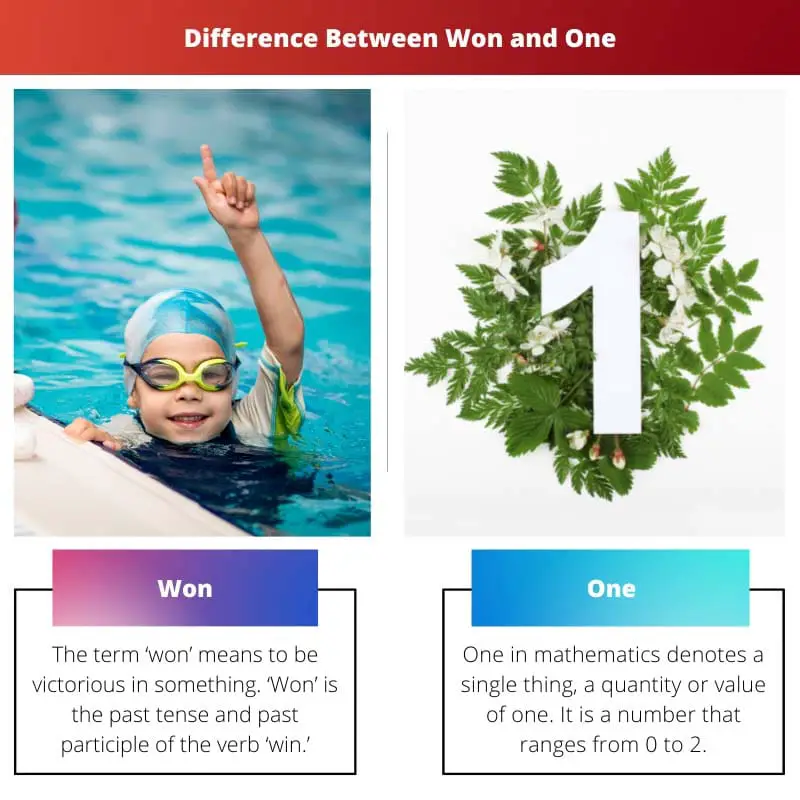Many English language learners have trouble spelling or using these words correctly.
‘Won’ and ‘one’ are homonyms that are frequently indistinguishable. Because the words ‘won’ and ‘one’ seem similar, it is easy to mix them up, yet they have distinct meanings. Let us see the difference between these two words.
Key Takeaways
- “Won” is the past tense of the verb “win,” indicating a victory or success in a competition or contest.
- “One” is a number representing a single unit or item in a collection or set.
- Homophones “won” and “one” have identical pronunciations but distinct meanings and usages in sentences.
Won vs One
The word won is used to refer to an activity that happened previously. It means to succeed or conquest. Won is the past tense of the verb win. One is referred to be a digit, but also a pronoun which is gender inclusive and used to specify a thing or a nonspecific person mentioned formerly.

The term ‘won’ means to be victorious in something. ‘Won’ is the past tense and past participle of the verb ‘win.’ We use it as an adjective and a noun in English grammar. The same term is also the basic monetary unit of the country of North and South Korea.
One in mathematics denotes a single thing, a quantity or value of one. It is a number that ranges from 0 to 2. One is the name of a number. It is a natural and odd number. The English word ‘one’ can either be an adjective, a noun, or a pronoun.
Comparison Table
| Parameters of Comparison | Won | One |
|---|---|---|
| Description | It refers to being victorious in a contest or conflict. | It refers to a single unit or thing. |
| Origin | The noun dates back to circa 1917, and the verb to before the 12th century. | As an adjective and noun, before the 12th century, whereas as a pronoun in the 13th century. |
| Etymology | This noun originates from the Korean word wŏn, and its verb form comes from the old English word wunian. | From middle English word on,an, from Old English ān, and Sanskrit word ‘eka.’ |
| Importance | We use it as a past participle of win. | It is a natural and an odd number and the lowest cardinal number. |
| Examples | Carlos won the game of chess. I won the argument with my brother. The woman won a million dollars in the lottery. | She has one child. The class starts in one hour. They will get married one day. |
What is Won?
The past tense of ‘won’ means to win a competition or contest or to persuade, influence, or persuade someone to support or approve of something that has been done. We can use it as a noun or a transitive verb (a verb that takes an object as an argument).
When used as a different part of speech, won conveys different meanings, such as:
Not vulnerable to defeat;
For example, That move won the game for me.
Fundamental monetary unit;
I do not have much won left with me.
British English also uses it as an intransitive verb which means ‘to dwell or live.’
Synonyms for won are conquered, prevailed, and triumphed.
Words related to won are overcome, swept, squeaked, squeezed, contended, vied, succeeded, breezed, and romped.
Antonyms for won are lost, collapsed, failed, flopped, folded, washed out, floundered, struggled, declined, slipped, slumped, and waned.
Phrases with the word won are won over, won out, won through, hard-won, Korean won, won ton, dearly-won, won tons, won Buddhism, North Korean won, won on points, won the day, won in a walk, won spurs, faint heart never won fair lady, evac won.

What is One?
One is both a natural and odd number. It is neither a composite nor a prime number. The result is always the same when a whole number is multiplied or divided by one. It is the only factor in itself.
Although it denotes singularity, it has a lot of meanings in the English language, such as:
being a single unit or thing;
For example, The baby is one year old.
Being one in particular;
For example, The Taj Mahal is one place I would like to visit.
Being preeminently what is indicated;
For example, She is one strict mother.
Being the same in kind or quality;
For example, Puma and cougar are different names for one animal.
constituting a compound of two or more components;
For example, The combined elements form one substance.
Synonyms of one are alone, lone, one-off, only, singular, sole, solitary, and unique.
Antonyms of one can be-
combined, collective, multiple, aggregate, composite, grouped.
Phrases Containing one –
are a/one step ahead of, act one’s age, against one’s will, advise one against, a figment of one’s imagination, after one’s own heart, a feather in one’s cap, a fight for one’s life, against one’s advice, according to one’s lights, against one’s better judgment.

Main Difference Between Won and One
- Won corresponds to being victorious or achieving any height in any activity, whereas one is a particular part or entity.
- In 1917, won became a noun, and in the 12th century, it became a verb. It was in the 13th century that ‘one’ became a pronoun. The adjective ‘one’ had been used as an adjective and noun since pre-12th century times.
- The Korean word won comes from the ancient English word wunian as both a noun and a verb. The word one derives from the Middle English word on,an, which comes from the Old English ān, and the Sanskrit word ‘eka.’
- Won most refers to a participle of the verb win. One is a natural and an odd number.
- Won is an adjective and a noun. In addition to acting as a noun, pronoun, and adjective, one can act as a quantifier and a determiner.

- https://www.cambridge.org/core/journals/language-in-society/article/semantics-of-winning-and-losing1/60CF8362BDD0C274B7BD02F9BCA26F50
- https://ieeexplore.ieee.org/abstract/document/805157/
